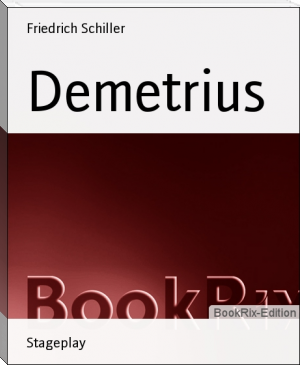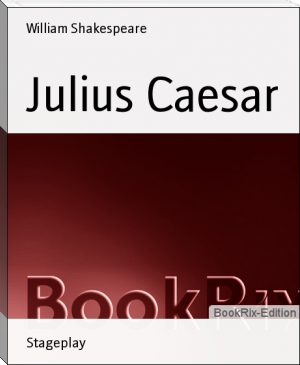Antony and Cleopatra - William Shakespeare (best ereader manga txt) 📗

- Author: William Shakespeare
Book online «Antony and Cleopatra - William Shakespeare (best ereader manga txt) 📗». Author William Shakespeare
PERSONS REPRESENTED.
M.ANTONY, Triumvir
OCTAVIUS CAESAR, Triumvir
M. AEMIL. LEPIDUS, Triumvir
SEXTUS POMPEIUS Triumvir
DOMITIUS ENOBARBUS, friend to Antony
VENTIDIUS, friend to Antony
EROS, friend to Antony
SCARUS, friend to Antony
DERCETAS, friend to Antony
DEMETRIUS, friend to Antony
PHILO, friend to Antony
MAECENAS, friend to Caesar
AGRIPPA, friend to Caesar
DOLABELLA, friend to Caesar
PROCULEIUS, friend to Caesar
THYREUS, friend to Caesar
GALLUS, friend to Caesar
MENAS, friend to Pompey
MENECRATES, friend to Pompey
VARRIUS, friend to Pompey
TAURUS, Lieutenant-General to Caesar
CANIDIUS, Lieutenant-General to Antony
SILIUS, an Officer in Ventidius's army
EUPHRONIUS, an Ambassador from Antony to Caesar
ALEXAS, attendant on Cleopatra
MARDIAN, attendant on Cleopatra
SELEUCUS, attendant on Cleopatra
DIOMEDES, attendant on Cleopatra
A SOOTHSAYER
A CLOWN
CLEOPATRA, Queen of Egypt
OCTAVIA, sister to Caesar and wife to Antony
CHARMIAN, Attendant on Cleopatra
IRAS, Attendant on Cleopatra
Officers, Soldiers, Messengers, and other Attendants
SCENE: Dispersed, in several parts of the Roman Empire.
ACT I.
SCENE I. Alexandria. A Room in CLEOPATRA'S palace.
[Enter DEMETRIUS and PHILO.]
PHILO.
Nay, but this dotage of our general's
O'erflows the measure: those his goodly eyes,
That o'er the files and musters of the war
Have glow'd like plated Mars, now bend, now turn,
The office and devotion of their view
Upon a tawny front: his captain's heart,
Which in the scuffles of great fights hath burst
The buckles on his breast, reneges all temper,
And is become the bellows and the fan
To cool a gipsy's lust.
[Flourish within.]
Look where they come:
Take but good note, and you shall see in him
The triple pillar of the world transform'd
Into a strumpet's fool: behold and see.
[Enter ANTONY and CLEOPATRA, with their trains; Eunuchs fanning her.]
CLEOPATRA.
If it be love indeed, tell me how much.
ANTONY.
There's beggary in the love that can be reckon'd.
CLEOPATRA.
I'll set a bourn how far to be belov'd.
ANTONY.
Then must thou needs find out new heaven, new earth.
[Enter an Attendant.]
ATTENDANT.
News, my good lord, from Rome.
ANTONY.
Grates me:--the sum.
CLEOPATRA.
Nay, hear them, Antony:
Fulvia perchance is angry; or who knows
If the scarce-bearded Caesar have not sent
His powerful mandate to you: 'Do this or this;
Take in that kingdom and enfranchise that;
Perform't, or else we damn thee.'
ANTONY.
How, my love!
CLEOPATRA.
Perchance! Nay, and most like:--
You must not stay here longer,--your dismission
Is come from Caesar; therefore hear it, Antony. --
Where's Fulvia's process?--Caesar's I would say?--Both?--
Call in the messengers.--As I am Egypt's queen,
Thou blushest, Antony; and that blood of thine
Is Caesar's homager: else so thy cheek pays shame
When shrill-tongu'd Fulvia scolds.--The messengers!
ANTONY.
Let Rome in Tiber melt, and the wide arch
Of the rang'd empire fall! Here is my space.
Kingdoms are clay: our dungy earth alike
Feeds beast as man: the nobleness of life
Is to do thus [Embracing]; when such a mutual pair
And such a twain can do't, in which I bind,
On pain of punishment, the world to weet
We stand up peerless.
CLEOPATRA.
Excellent falsehood!
Why did he marry Fulvia, and not love her?--
I'll seem the fool I am not; Antony
Will be himself.
ANTONY.
But stirr'd by Cleopatra.--
Now, for the love of Love and her soft hours,
Let's not confound the time with conference harsh:
There's not a minute of our lives should stretch
Without some pleasure now:--what sport to-night?
CLEOPATRA.
Hear the ambassadors.
ANTONY.
Fie, wrangling queen!
Whom everything becomes,--to chide, to laugh,
To weep; whose every passion fully strives
To make itself in thee fair and admir'd!
No messenger; but thine, and all alone
To-night we'll wander through the streets and note
The qualities of people. Come, my queen;
Last night you did desire it:--speak not to us.
[Exeunt ANTONY and CLEOPATRA, with their Train.]
DEMETRIUS.
Is Caesar with Antonius priz'd so slight?
PHILO.
Sir, sometimes when he is not Antony,
He comes too short of that great property
Which still should go with Antony.
DEMETRIUS.
I am full sorry
That he approves the common liar, who
Thus speaks of him at Rome: but I will hope
Of better deeds to-morrow. Rest you happy!
[Exeunt.]
SCENE II. Alexandria. Another Room in CLEOPATRA'S palace.
[Enter CHARMIAN, IRAS, ALEXAS, and a Soothsayer.]
CHARMIAN.
Lord Alexas, sweet Alexas, most anything Alexas, almost
most absolute Alexas, where's the soothsayer that you praised so to the queen? O that I knew this husband, which you say must charge his horns with garlands!
ALEXAS.
Soothsayer,--
SOOTHSAYER.
Your will?
CHARMIAN.
Is this the man?--Is't you, sir, that know things?
SOOTHSAYER.
In nature's infinite book of secrecy
A little I can read.
ALEXAS.
Show him your hand.
[Enter ENOBARBUS.]
ENOBARBUS.
Bring in the banquet quickly; wine enough
Cleopatra's health to drink.
CHARMIAN.
Good, sir, give me good fortune.
SOOTHSAYER.
I make not, but foresee.
CHARMIAN.
Pray, then, foresee me one.
SOOTHSAYER.
You shall be yet far fairer than you are.
CHARMIAN.
He means in flesh.
IRAS.
No, you shall paint when you are old.
CHARMIAN.
Wrinkles forbid!
ALEXAS.
Vex not his prescience; be attentive.
CHARMIAN.
Hush!
SOOTHSAYER.
You shall be more beloving than beloved.
CHARMIAN.
I had rather heat my liver with drinking.
ALEXAS.
Nay, hear him.
CHARMIAN.
Good now, some excellent fortune! Let me be married to three
kings in a forenoon, and widow them all: let me have a child at
fifty, to whom Herod of Jewry may do homage: find me to marry me
with Octavius Caesar, and companion me with my mistress.
SOOTHSAYER.
You shall outlive the lady whom you serve.
CHARMIAN.
O, excellent! I love long life better than figs.
SOOTHSAYER.
You have seen and prov'd a fairer former fortune
Than that which is to approach.
CHARMIAN.
Then belike my children shall have no names:--pr'ythee, how many
boys and wenches must I have?
SOOTHSAYER.
If every of your wishes had a womb,
And fertile every wish, a million.
CHARMIAN.
Out, fool! I forgive thee for a witch.
ALEXAS.
You think none but your sheets are privy to your wishes.
CHARMIAN.
Nay, come, tell Iras hers.
ALEXAS.
We'll know all our fortunes.
ENOBARBUS.
Mine, and most of our fortunes, to-night, shall be--
drunk to bed.
IRAS.
There's a palm presages chastity, if nothing else.
CHARMIAN.
E'en as the o'erflowing Nilus presageth famine.
IRAS.
Go, you wild bedfellow, you cannot soothsay.
CHARMIAN.
Nay, if an oily palm be not a fruitful prognostication, I cannot
scratch mine ear.--Pr'ythee, tell her but worky-day fortune.
SOOTHSAYER.
Your fortunes are alike.
IRAS.
But how, but how? give me particulars.
SOOTHSAYER.
I have said.
IRAS.
Am I not an inch of fortune better than she?
CHARMIAN.
Well, if you were but an inch of fortune better than I, where
would you choose it?
IRAS.
Not in my husband's nose.
CHARMIAN.
Our worser thoughts heavens mend!--Alexas,--come, his fortune!
his fortune!--O, let him marry a woman that cannot go, sweet
Isis, I beseech thee! And let her die too, and give him a worse!
and let worse follow worse, till the worst of all follow him
laughing to his grave, fiftyfold a cuckold! Good Isis, hear me
this prayer, though thou deny me a matter of more weight; good
Isis, I beseech thee!
IRAS.
Amen. Dear goddess, hear that prayer of the people! for, as it is
a heartbreaking to see a handsome man loose-wived, so it is a
deadly sorrow to behold a foul knave uncuckolded: therefore, dear
Isis, keep decorum, and fortune him accordingly!
CHARMIAN.
Amen.
ALEXAS.
Lo now, if it lay in their hands to make me a cuckold, they would
make themselves whores but they'd do't!
ENOBARBUS.
Hush! Here comes Antony.
CHARMIAN.
Not he; the queen.
[Enter CLEOPATRA.]
CLEOPATRA.
Saw you my lord?
ENOBARBUS.
No, lady.
CLEOPATRA.
Was he not here?
CHARMIAN.
No, madam.
CLEOPATRA.
He was dispos'd to mirth; but on the sudden
A Roman thought hath struck him.--Enobarbus,--
ENOBARBUS.
Madam?
CLEOPATRA.
Seek him, and bring him hither.--Where's Alexas?
ALEXAS.
Here, at your service.--My lord approaches.
CLEOPATRA.
We will not look upon him: go with us.
[Exeunt CLEOPATRA, ENOBARBUS, CHAR., IRAS, ALEX., and
Soothsayer.]
[Enter ANTONY, with a MESSENGER and Attendants.]
MESSENGER.
Fulvia thy wife first came into the field.
ANTONY.
Against my brother Lucius.
MESSENGER.
Ay:
But soon that war had end, and the time's state
Made friends of them, jointing their force 'gainst Caesar;
Whose better issue in the war, from Italy
Upon the first encounter, drave them.
ANTONY.
Well, what worst?
MESSENGER.
The nature of bad news infects the teller.
ANTONY.
When it concerns the fool or coward.--On:--
Things that are past are done with me.--'Tis thus;
Who tells me true, though in his tale lie death,
I hear him as he flatter'd.
MESSENGER.
Labienus,--
This is stiff news,--hath, with his Parthian force,
Extended Asia from Euphrates;
His conquering banner shook from Syria
To Lydia and to Ionia;
Whilst,--
ANTONY.
Antony, thou wouldst say,--
MESSENGER.
O, my lord!
ANTONY.
Speak to me home, mince not the general tongue:
Name Cleopatra as she is call'd in Rome;
Rail thou in Fulvia's phrase; and taunt my faults
With such full licence as both truth and malice
Have power to utter. O, then we bring forth weeds
When our quick minds lie still; and our ills told us
Is as our earing. Fare thee well awhile.
MESSENGER.
At your noble pleasure.
[Exit.]
ANTONY.
From Sicyon, ho, the news! Speak there!
FIRST ATTENDANT.
The man from Sicyon--is there such an one?
SECOND ATTENDANT.
He stays upon your will.
ANTONY.
Let him appear.--
These strong Egyptian fetters I must break,
Or lose myself in dotage.--
[Enter another MESSENGER.]
What are you?
SECOND MESSENGER.
Fulvia thy wife is dead.
ANTONY.
Where died she?
SECOND MESSENGER.
In Sicyon:
Her length of sickness, with what else more serious
Importeth thee to know, this bears. [Gives a letter.]
ANTONY.
Forbear me.
[Exit MESSENGER.]
There's a great spirit gone! Thus did I desire it:
What our contempts doth often hurl from us,
We wish it ours again; the present pleasure,
By revolution lowering, does become
The opposite of itself: she's good, being gone;
The hand could pluck her back that shov'd her on.
I must from this enchanting queen break off:
Ten thousand harms, more than the ills I know,
My idleness doth hatch--ho, Enobarbus!
[Re-enter ENOBARBUS.]
ENOBARBUS.
What's your pleasure, sir?
ANTONY.
I must with





Comments (0)